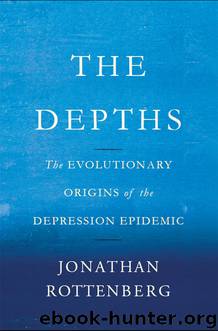The Depths by Rottenberg Jonathan

Author:Rottenberg, Jonathan [Rottenberg, Jonathan]
Language: eng
Format: epub
ISBN: 9780465069736
Publisher: Basic Books
Hunch 1: Early Improvers Face Fewer Complex Life Problems
Recall the predicament of the mood system. Its task is to sum up what the environment holds, its available threats, and opportunities for action, and to direct behavior forward or allow us to stay in place. Consider Jane, a young woman who is depressed in the wake of the acrimonious breakup of an intense romantic relationship. This kind of discrete problem might benefit from a cocoon of low mood—a protected pause to analyze the past and develop solutions. Her low mood is likely to pass as she makes decisions about the future, whether that means searching for a man with different qualities than her ex or taking a break from dating entirely. Jane’s story typifies one sort of early improver, someone whose depression enabled her to arrive at a reasonable solution to a vexing, but manageable, problem.
What about when multiple problems arrive simultaneously? Imagine if on top of the breakup, Jane’s mother was diagnosed with Alzheimer’s. Increasingly frail, her mother can no longer live independently. Jane’s younger brother has decided he can’t cope with the situation, leaving it to Jane to arrange all the medical care and housing. In this scenario, with multiple open problems simultaneously, Jane is less likely to be an early improver.
Depressions, of course, aren’t always tied to a specific life event; they often come attached to a variety of slow-moving difficulties, whether psychiatric, medical, or psychosocial. Notably, these are problems like severe symptoms of anxiety, substance abuse, chronic pain, and the burden of serious ongoing health issues.17 And new stressors can result from the depression itself. If a depressed man can’t concentrate, his job performance suffers as a result, which leads to his losing his job when his company downsizes, meaning additional financial difficulties.18 Consistent with the idea that combinations of problems may be less manageable than individual problems, one study found that having three stressful life events was actually four times as bad for future depression as having two stressful life events.19 With each new problem, the mood system must face a longer and more complex equation with more unknown terms. When there are no solutions at hand, we should expect sluggish mood improvement at best.
Download
This site does not store any files on its server. We only index and link to content provided by other sites. Please contact the content providers to delete copyright contents if any and email us, we'll remove relevant links or contents immediately.
Should I Stay or Should I Go? by Ramani Durvasula(7641)
Why We Sleep: Unlocking the Power of Sleep and Dreams by Matthew Walker(6686)
Fear by Osho(4723)
Flow by Mihaly Csikszentmihalyi(4671)
Rising Strong by Brene Brown(4435)
Why We Sleep by Matthew Walker(4421)
The Hacking of the American Mind by Robert H. Lustig(4356)
How to Change Your Mind by Michael Pollan(4340)
Too Much and Not the Mood by Durga Chew-Bose(4324)
Lost Connections by Johann Hari(4164)
He's Just Not That Into You by Greg Behrendt & Liz Tuccillo(3873)
Evolve Your Brain by Joe Dispenza(3653)
The Courage to Be Disliked by Ichiro Kishimi & Fumitake Koga(3473)
Crazy Is My Superpower by A.J. Mendez Brooks(3380)
In Cold Blood by Truman Capote(3366)
Resisting Happiness by Matthew Kelly(3331)
What If This Were Enough? by Heather Havrilesky(3298)
The Book of Human Emotions by Tiffany Watt Smith(3284)
Descartes' Error by Antonio Damasio(3263)
